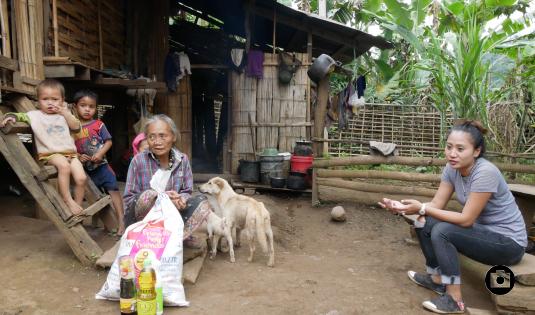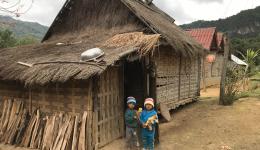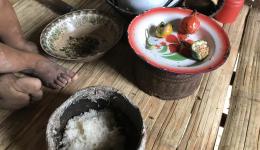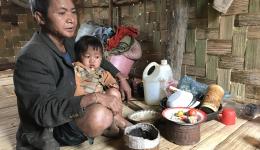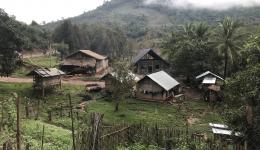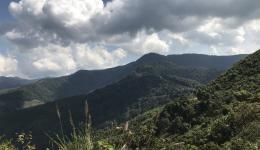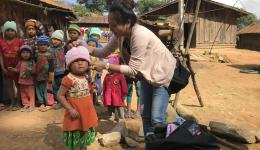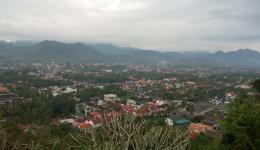Registered Nonprofit
Association for the Support
of Children and Needy
People Around the World
Unterstützung
Aid packages for remote villages
Sun, Feb. 3rd, 2019 - 2:50, written by Alexandra, published by Frank
Laos
In January 2019, Florian, Keo and Alexandra visit remote villages in northern Laos. The Southeast Asian country through which the Mekong flows is famous for its mountains, French colonial architecture, mountain tribal settlements and countless Buddhist temples. With an area of 236,800 km² and about 7 million inhabitants, the state borders on China, Vietnam, Cambodia, Thailand and Myanmar.
Laos is an agricultural state. About 80 % of the population is working in agriculture. Contrary to Thailand and increasingly also Cambodia or Vietnam, the country is still largely untouched by large tourist flows.
Due to low per capita income, poor health of the population and lack of tourist infrastructure, the country is currently - with the exception of Luang Prabang, Vang Vieng and Vientiane - unattractive for package holiday tourists. Nevertheless, tourism is one of the emerging economic sectors.
Laos has a low literacy rate. Only two-thirds of men and one-third of women over the age of 15 can read and write. Two thirds of Laotian children leave primary school prematurely in order to contribute to the family's livelihood, especially by field work.
The unexploded bombs from the Vietnam War are a particular problem. They make the country one of the states with the largest amount of unexploded war material in the soil. Of the more than two million tons of bombs dropped by the American air forces between 1964 and 1973 in more than 530,000 air raids over Laos, about 50 percent of the country are still affected today. People are regularly injured or killed by unexploded ordnance. (cf. Wikipedia)
Fortunately, Keo found an experienced driver and an all-wheel drive car that could be rented. This turned out to be more difficult than initially thought, because very few Laotians can afford a car. Also in the cities people use bicycles and one who can manage it, saves for a scooter. In most regions, however, scooters and bicycles are still considered as luxury goods.
At this time of the year it rains unusually much, so the unpaved roads are even muddier and have deep holes. Watercourses can often only be crossed by fords.
Every day new villages are visited to support families, single old or disabled people with food and hygiene packages, warm caps and occasionally with a small monthly income supplement.
The living conditions are sobering and the buildings in which the people live are reminiscent of medieval times. If you look into one of the huts, you can see rice in bamboo baskets. In iron pots belonging to a 75-year-old woman, we see some dried mushrooms and herbs. In spite of the poverty, which is apparent everywhere, one is touched by the fine, almost distinguished looks of the inhabitants.
A little boy limps through the mud towards Florian. He also wants to pick up one of the warm caps that are being handed out. An old piece of cloth is tied around his foot. "What happened to your foot?" we want to know. The boy had just stepped into a nail. When asked, the mother explains that she would like to take the boy to the medical station, but that she had no money for it.
Half an hour later the mother and the little one are sitting in our jeep and two hours later the foot is medicated and the mother gets medicine and bandages to take along.The hospital bill is 50,000 Laotian kip, which is about 5 euros.
We would like to say THANK YOU to ALL friends at home for any action you come up with and for all your generous donations!
THANKS also to Nina for the valuable tip to visit the people who belong to the minorities in Laos, who do not speak Lao, English or French and who have a particularly hard time...
Sun, Jan, 13, 2019 - 8:01, written by Frank, published by Frank
Team on the road in Laos
Since one week Alexandra is in Laos, where she is together with Florian and Keo on the road in the outback. Starting from Luang Prabang in the north of the country, the way leads them on dirt roads to secluded villages.
Here are some first photos before we will report with more information and pictures ...
